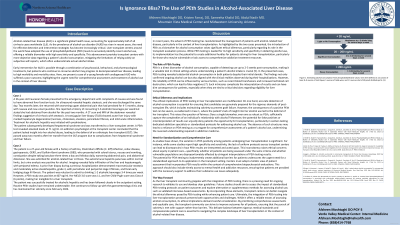Monday Poster Session
Category: Liver
P3027 - Is Ignorance Bliss? The Use of PEth Studies in Alcohol-Associated Liver Disease
Monday, October 28, 2024
10:30 AM - 4:00 PM ET
Location: Exhibit Hall E

Has Audio

Afsheen Moshtaghi, DO
Verde Valley Medical Center
Cottonwood, AZ
Presenting Author(s)
Afsheen Moshtaghi, DO1, Kristen Farraj, DO2, Sameeha Khalid, DO3, Abdul Nadir, MD4
1Verde Valley Medical Center, Cottonwood, AZ; 2Mountain Vista Medical Center, Phoenix, AZ; 3Mountain Vista Medical Center, Gilbert, AZ; 4Mountain Vista Medical Center, Mesa, AZ
Introduction: Alcohol-related liver disease is responsible for roughly half of all cirrhosis cases worldwide. Liver transplant centers across the world have adopted Phosphatidylethanol (PEth) levels to identify recent alcohol use with high sensitivity and specificity. This allows for transplant centers to have a more definitive, subjective values for alcohol use rather than relying on subjective reports from patients which can grossly underestimate alcohol consumption.
Case Description/Methods: Case 1
A 36-year-old female presented with worsening upper abdominal pain, nausea, and jaundice for four weeks. The patient admitted to previously drinking 5-6 alcoholic beverages per week but adamantly denied any alcohol use in over 2 months. A liver biopsy showed acute liver injury with marked hepatocyte degeneration/necrosis, steatosis, and pericellular fibrosis.PEth test was positive at 71 ng/ml and an addiction psychologist concluded that she did not have insight regarding her alcohol abuse which postponed liver transplant status. Due to this delay, the patient expired 2 months later due to complications of her liver failure.
Case 2
A 27-year-old female presented with scleral icterus, worsening abdominal pain, and distension and was admitted for alcohol-related liver cirrhosis. A previously obtained liver biopsy showed grade 3 with pericellular periportal stage II fibrosis and focal early bridging stage III by fibrosis. The patient was reluctant to admit to drinking 1-2 drinks 3-4 times per week. However, a PEth study was positive at 407 ng/ml. The patient's MELD 3.0 score was 11 and Child Pugh Class A (6 points), so she was not eligible for a liver transplant. The patient was successfully treated for alcoholic hepatitis and has been followed closely in the outpatient setting, with routine PEth studies remaining undetectable.
Discussion: PEth studies have become a highly debated topic in liver transplant centers in recent years. The first case highlights the "zero tolerance" policy of alcohol use in the evaluation of liver transplants. One may question: if PEth studies were not available as a marker, would this patient have received a new liver and been given a fighting chance for life? The second case touches on the subjective value of the PEth allowing practitioners to give adequate support and medications for suppressing alcohol craving to a successful road to recovery. In both cases, patients significantly underestimated their alcohol consumption due to fear of stigma or lack of insight into their illness.
Disclosures:
Afsheen Moshtaghi, DO1, Kristen Farraj, DO2, Sameeha Khalid, DO3, Abdul Nadir, MD4. P3027 - Is Ignorance Bliss? The Use of PEth Studies in Alcohol-Associated Liver Disease, ACG 2024 Annual Scientific Meeting Abstracts. Philadelphia, PA: American College of Gastroenterology.
1Verde Valley Medical Center, Cottonwood, AZ; 2Mountain Vista Medical Center, Phoenix, AZ; 3Mountain Vista Medical Center, Gilbert, AZ; 4Mountain Vista Medical Center, Mesa, AZ
Introduction: Alcohol-related liver disease is responsible for roughly half of all cirrhosis cases worldwide. Liver transplant centers across the world have adopted Phosphatidylethanol (PEth) levels to identify recent alcohol use with high sensitivity and specificity. This allows for transplant centers to have a more definitive, subjective values for alcohol use rather than relying on subjective reports from patients which can grossly underestimate alcohol consumption.
Case Description/Methods: Case 1
A 36-year-old female presented with worsening upper abdominal pain, nausea, and jaundice for four weeks. The patient admitted to previously drinking 5-6 alcoholic beverages per week but adamantly denied any alcohol use in over 2 months. A liver biopsy showed acute liver injury with marked hepatocyte degeneration/necrosis, steatosis, and pericellular fibrosis.PEth test was positive at 71 ng/ml and an addiction psychologist concluded that she did not have insight regarding her alcohol abuse which postponed liver transplant status. Due to this delay, the patient expired 2 months later due to complications of her liver failure.
Case 2
A 27-year-old female presented with scleral icterus, worsening abdominal pain, and distension and was admitted for alcohol-related liver cirrhosis. A previously obtained liver biopsy showed grade 3 with pericellular periportal stage II fibrosis and focal early bridging stage III by fibrosis. The patient was reluctant to admit to drinking 1-2 drinks 3-4 times per week. However, a PEth study was positive at 407 ng/ml. The patient's MELD 3.0 score was 11 and Child Pugh Class A (6 points), so she was not eligible for a liver transplant. The patient was successfully treated for alcoholic hepatitis and has been followed closely in the outpatient setting, with routine PEth studies remaining undetectable.
Discussion: PEth studies have become a highly debated topic in liver transplant centers in recent years. The first case highlights the "zero tolerance" policy of alcohol use in the evaluation of liver transplants. One may question: if PEth studies were not available as a marker, would this patient have received a new liver and been given a fighting chance for life? The second case touches on the subjective value of the PEth allowing practitioners to give adequate support and medications for suppressing alcohol craving to a successful road to recovery. In both cases, patients significantly underestimated their alcohol consumption due to fear of stigma or lack of insight into their illness.
Disclosures:
Afsheen Moshtaghi indicated no relevant financial relationships.
Kristen Farraj indicated no relevant financial relationships.
Sameeha Khalid indicated no relevant financial relationships.
Abdul Nadir indicated no relevant financial relationships.
Afsheen Moshtaghi, DO1, Kristen Farraj, DO2, Sameeha Khalid, DO3, Abdul Nadir, MD4. P3027 - Is Ignorance Bliss? The Use of PEth Studies in Alcohol-Associated Liver Disease, ACG 2024 Annual Scientific Meeting Abstracts. Philadelphia, PA: American College of Gastroenterology.
